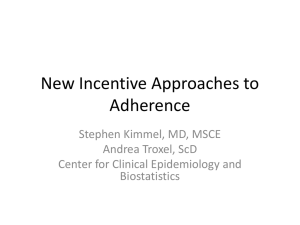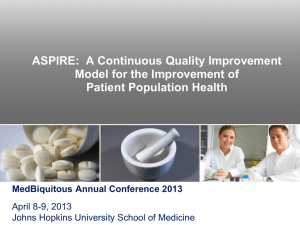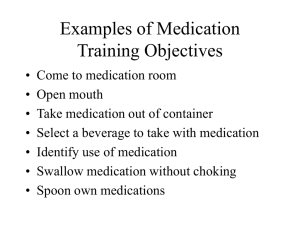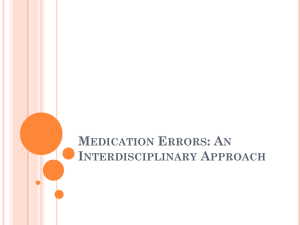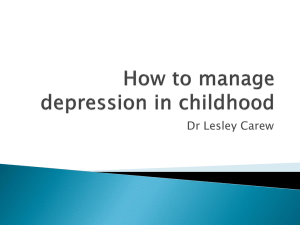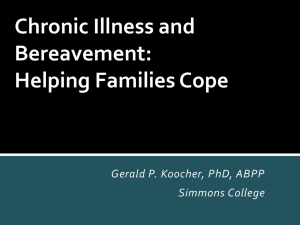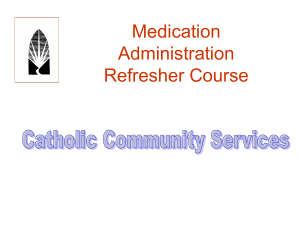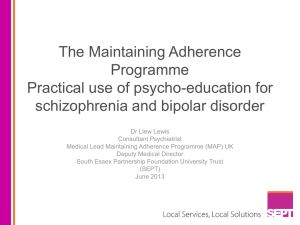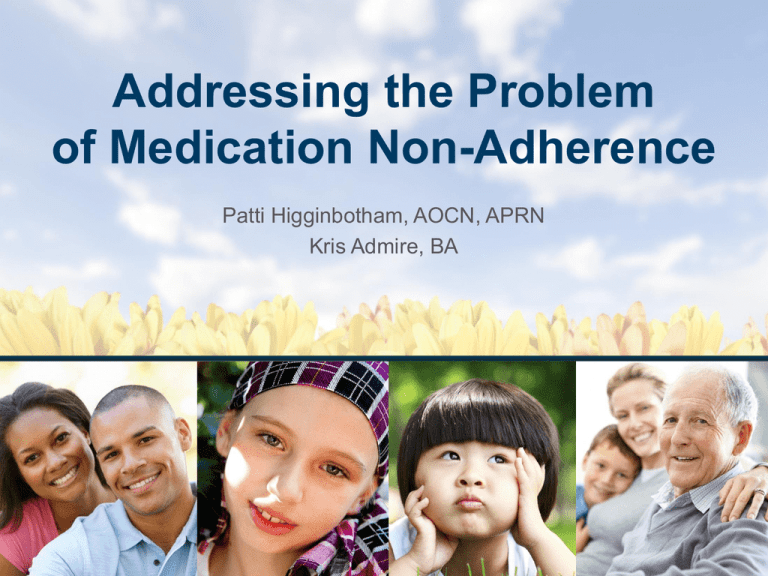
Addressing the Problem
of Medication Non-Adherence
Patti Higginbotham, AOCN, APRN
Kris Admire, BA
1
2
Session Objectives
Following this session we will better understand:
Medication Non-Adherence
Patient Adherence Challenges
The Impact of Specialty Pharmacy and Patient Centered
Care Services
Patient Education and Support Resources
Powerful Touch Points to Engage and Empower Patients and
Caregivers
3
Define medication
non-adherence and the
challenges contributing to
this growing problem
Adherence can be defined as
the extent to which a
patient’s behavior coincides
with medical advice
LaFountain, A. (2010). Adherence: Missing the mark. Retrieved from http//pharmexec.com
LaFountain, A. (2011). The forgotten illness. Media Planet, 3 (1), 8.
Smith, M. (2013). America’s health care problems? The solutions exist .Managed Care. 22(1), 32-35.
Haynes, R.B., Taylor, D.W., Sackett, D. L.. (1979). Compliance in health care. Baltimore, MD: The John Hopkins University Press.
4
Non- Adherence as a Growing Problem
Multifaceted /
Complex issue
Shifted the burden
Surprisingly
ignored for a long
time
Increasing
health costs
Increasing use of
complementary
therapies
5
World Health Organization
“Increasing the effectiveness of
adherence interventions may have far
greater impact on the health of the
population than any other improvement
in specific medical treatments.”
6
Medication Nonadherence:
A Diagnosable and Treatable
Medical Condition
JAMA, May 22/29, 2013—Vol 309, No. 20 pg. 2105
7
Compliance vs. Adherence
Compliance
Adherence
Consistency and accuracy with
which a patient follows a
regimen
Implies subordinate
relationship
Too closely associated with
blame
Defines the extent to which a
patient’s behavior corresponds
with agreed upon
recommendations
D’Amato, S. (2008). Improving patient adherence with oral chemotherapy. Oncology Issues, July/August, 42-45.
8
Types of Non- Adherence
Primary
Secondary
Unintentional
Intentional
• Trends
Web Induced
Specialist – FP
Lack of motivation/ fear of potential side effects
Stefanacci, R., & Guerin, S. (2013). Why medication adherence matters to patients, payers, providers. Managed Care, 22(1), 37-39.
9
Reasons For Nonadherence
Patient understanding connection btw
adherence and continued health
Patient concluded benefits not out
weighing cost
Complexity of regimen
Patient factors, forgetfulness
Beliefs about medications
Perception of medication to have
therapeutic efficacy
10
Identify Why Non-adherence
Matters in Healthcare
Economics
Patient Outcomes
Stefanacci, R., & Guerin, S. (2013). Why medication adherence matters to patients, payers, providers. Managed Care, 22(1), 37-39.
11
Economics
Estimated $100 billion in healthcare
costs
• Readmission rates
• Increase in physician visits
• Increase in emergency room
visits
• Medication adherence is central
to CMS Quality Rating System
• Cost of recurrence($11-19,000
over ten years)
D’Amato, S. (2008). Improving patient adherence with oral chemotherapy. Oncology Issues, July/August, 42-45.SEER –Medicare data 2008
12
Compromised Patient Outcomes
Estimated 125,000 deaths
annually in U.S.
Decreased patient satisfaction
Poor patient/provider relationships
Compromised disease outcomes,
decreased survival
Decreased quality of life
Gangloff, J.M. (2013) Troubling trend. Cure Spring
13
Identify Patient Adherence Challenges and Major
Predictors of Poor Adherence to Medication
Studies
• Demographics
• Patient Outcomes
Ginex, P., Thom, B., Anthony, V., Russell, C., & Gromisch, C. (2012). A pilot study to identify patient factors impacting adherence to oral chemotherapy. Oncology
Nursing Forum, 39 (3), E176.
Hershman, D. L., Kushi, L.H., Shao, T., Buono, D., Kershenbaum, A., Tsas, W.Y., .,.,., Neugut, A.I. (2010). Early discontinuation and nonadherence to adjuvant
hormonal therapy in a cohort of 8,769 early- stage breast cancer patients. Journal of Clinical Oncology,28(27), 4120-4128.
14
Studies: Demographics
(Hershman, 2010 )
1996-2007, examined pharmacy records of 8,769
women
49% completed their full regimen of hormone therapy
Women younger than 40, highest rate of
non-adherence
• At 4.5 years, 32% had discontinued therapy
Women who had lumpectomy more likely to have
discontinued therapy early
Hershman, D. L., Kushi, L.H., Shao, T., Buono, D., Kershenbaum, A., Tsas, W.Y., .,.,.,Neugut, A.I. (2010). Early discontinuation and
nonadherence to adjuvant hormonal therapy in a cohort of 8,769 early- stage breast cancer patients. Journal of Clinical Oncology, 28(27),
15
Predictors of Nonadherence
Ginex (ongoing study)
• Examining factors that may predict which patients are more likely to
follow an oral anticancer regimen
16
When the world says “Give up,”
Hope whispers, “Try one more time.”
-- Author Unknown
“Nearly one quarter of all people with cancer
now use oral medications as part of their
overall cancer treatment.”
“Important Issues in Medication Adherence” Overview Patient Resource Cancer Guide - Medication Adherence 2012 pp. 1
Website: www.patientresource.com/medication_adherence_overview
18
Bridges to Improve Medication Non- Adherence
Specialty Pharmacy:
Maximizing Outcomes
Patient Education and
Resources: Engaging and
Empowering
Support and
Communication: Powerful
touch points between
patients and the extended
healthcare team
19
The Landscape in Cancer Care
“There has been a seismic shift in the way we treat cancer over
the last several years & medication adherence has become a
serious issue.” (CURE PG 4)
“As oral oncology medications are more widely used, patient
adherence issues increase.” (CURE PG4)
“Non-adherence is a growing problem. Now there are many oral
oncology medications and the responsibility is completely on the
patient to take them or not.” (CURE PG12)
CURE Supplement to CURE Magazine: “Special Report on Medication Adherence” (2012) Pp.. 4-12
20
Troubling Trends & Statistics
Impacting Medication Adherence
Roughly 125,000 people die each year in the United
States because they do not take their medication
properly
33-63% of medication related hospital admissions are
related to non-adherence and account for $8.5 Billion
annually
14-21% of patients never fill their original prescriptions
30-50% of all patients do not properly follow
prescribed medication instructions
12-20% of patients take other people’s medication
Prescription drugs represent the fastest growing cost
component for health plans today
Enhancing Prescription Medication Adherence: A National Action Plan, Bethesda, MD. USA Aug. 2007
21
The Medication Non-Adherence Epidemic:
A BILLION-DOLLAR
HEALTHCARE CRISIS
Three Most Common Factors
Forgetfulness
Understanding
Medication Costs
Dispensing Excellence, Issue 1 -Spring 2013 pp. 1
Patient Reported Reasons for
Non-Adherence to Medication
Non- Adherent Behavior
(Study of 1,020 Adults [40+] taking Prescribed Rx for a Chronic Medical Condition)
Forget to take Medication
42%
Run out of Medication
34%
Away from Home
27%
Attempt to Save Money
22%
Unpleasant Side Effects
21%
Too Busy
17%
Believed Medication was not needed
16%
Dislike taking Medication
12%
Scott, G.N. (2013) Adherence Report Card: Is Patient Tutoring Needed? Medscape. Jul 19,2013
23
% Reporting
Behavior
Pharmacists are
Key Partners in the
Future of
Healthcare
On a national level,
medication non-adherence
costs nearly
$290 Billion annually …
A significant source of waste
in our healthcare system
Anderson, S. (2011). Pharmacists: Reducing Costs, Saving Lives.
Media Planet, 3(1), 9-10.
24
Specialty Pharmacy Defined
Specialty
Medication
Characteristics
Targets Chronic or
Complex Conditions
Limited Access
Special Handling,
Distribution and/or
Administration
Requirements
Specialized
Pharmacy Services
Prior Authorization
Insurance Verification and
Coordination of Benefits
Patient Copay Assistance
Physician Contact
Proactive Patient
Counseling & Education
FDA-mandated Risk
Evaluation Mitigation
Strategy (REMS)
Program
Side Effect Management
Often High Cost
Data / Reporting
*Adapted from Blaser DA, et.al How to Define Specialty Pharmaceuticals – A Systematic Review. Am J Pharm Benefits. 2010;2(6).371-380.
25
*
Dedicated Patient Care Team
Enrollment
Specialist
Care
Coordinator
Specialist
Coordination of benefits
Prior authorization assistance
Detailed review out-of-pocket
Refill reminders &
patient costs
Patient assistance programs;
grants and foundations
scheduling; delivery follow-up
Clinical Oncology
Pharmacist
24/7 availability
Counseling, side effect
management
Billing
Coordinator
Insurance review
Multiple payer processing
26
Patients ALWAYS
speak with a member
of their team
Nursing
Services
In-home injection training
Same nurse each time
©2012
Amber Enterprises, Inc., d.b.a. Amber Pharmacy
Demonstrating Value
to Healthcare Providers
27
Medication Adherence Effects
Quality in Cancer Care
“Quality care is the
right diagnosis
and the right treatment
in the right environment.”
NCCN Oncology Policy Summit: Measuring Quality in Oncology – Challenges & Opportunities Jul. 2013
28
Key Factors for Proper Adherence
1.
2.
3.
4.
5.
6.
The Right Drug
The Right Dose
At the Right Time
On the Right Schedule
Under the Right Conditions
With the Right Precautions
Patient Resources & Cancer Guide – Medication Adherence, Overview, 2012 pp. (1)
29
Methods of Measuring Adherence
Direct & Indirect Methods
Direct Methods of Measuring Adherence
• Direct Observation
• Lab Values & Test Measures
Indirect Methods of Measuring Adherence
• Patient Questionnaires & Assessments
• Pill Counts
• Frequency of Prescription Refills
• Patient Journals & Medication Trackers
• Advanced Technology
• Smart Phone Apps & Reminders
• Rx Bottle Glow Caps
Osterberg,L.& Blaschke, T. (2005) Adherence to Medication.The New England Journal of Medicine ; 353:489
30
Smart Phone Medication Apps
MedCoach Medication Reminder
• Medications, refill reminders, history, doctors, pharmacies, etc.
Drugs.com
• Includes “My Drug List” Drugs A-Z, drugs by condition, pill identifier,
interactions checker, side effects, phonetic search, Q & A, etc.
iTriage
• Search symptoms, doctors, hospitals, conditions, medications,
health news, etc.
Pill Monitor
• Designed to manage pills and medications, pill reminders, history of
taking medications and pill monitor data.
(Logs can be shared by email)
31
Medication Adherence Assessments
Morisky 8 – Item Medication
Adherence Questionnaire
ASK 20 – Adherence
Barrier Survey
Morisky DR, Green LW, Levine DM. Concurrent and predictive validity of a self-reported measure of medication adherence. Med Care 1986; 24:67-74
ASK-20 Hahn SR, Yu-Isenberg KS, Priest JL, Skinner EP, Weaver MB, Olson PS. A comparison of barriers to medication adherence in patients with chronic conditions.
Poster presented at: Society of general Internal Medicine 29 th Annual Meeting; April 26-29, 2006
32
“Communication is the cornerstone
of medication adherence.”
“Important Issues in Medication Adherence” Overview
Patient Resource Cancer Guide - Medication Adherence 2012 pp. 2.
Patient Education
& Resources Program
An exclusive program
designed to assist and
support specialty pharmacy
patients and caregivers
dealing with specialized
health conditions
34
Patient Care Methods
to Improve Medication Adherence
Patient Education
Monitor Dosing Schedules
Communication
Osterberg,L.& Blaschke, T. (8-4-2005) Adherence to Medication. The New England Journal of Medicine; 353:5 491
35
Patient Empowerment
Stories of hope, courage and compassion
Amber Pharmacy - Patient & Caregiver Case Studies; Referenced Organizations & Agencies in Website Bibliography
Farah
Linda and
mother, Ann
Ruth
38
Medication Adherence - Bibliography
39
Aitken, M. (2013) Avoidable Costs in US Healthcare: the $200 Billion Opportunity from Using Medicines More
Responsibly. Reported by the IMS Institute for Healthcare Infomatics. (5)
ASK-20 Hahn SR., Yu-Isenberg KS., Priest JL, Skinner EP, Weaver MB., Olson PS.
A Comparison of Barriers to Medication Adherence in Patients with Chronic Conditions
Poster presented at: Society of General Internal Medicine 29th Annual Meeting; April 26-29, 2006
CURE Supplement to CURE Magazine – “Special Report on Medication Adherence” (2012) pp. 4-12
Dispensing Excellence Issue 1- Spring 2013 pp.1
Enhancing Prescription Medication Adherence: A National Action Plan, Bethesda, MD. USA August 2007
McKethan,A., Benner, J., Brookhart,A. (2012) Seizing The Opportunity To Improve Medication Adherence”
Health Affairs Blog. August 28th, 2012
Morisky DR, Green LW, Levine DM. Concurrent and predictive validity of a self-reported measure of medication
adherence. Med Care 1986; 24:67-74
NCCN Oncology Policy Summit: Measuring Quality in Oncology – Challenges & Opportunities Jul. 2013
Osterberg,L.& Blaschke, T. (8-4-2005) “Adherence to Medication”. The New England Journal of Medicine;
353:5 487
Patient Resources & Cancer Guide – Medication Adherence, Overview, 2012 pp. (1)
Scott, G.N. (2013) Adherence Report Card: Is Patient Tutoring Needed? Medscape Jul 19, 2013
Stefanacci, R., & Guerin, S. (2013). Why medication adherence matters to patients, payers, providers.
Managed Care, 22(1), 37-39
Questions & Answers
Thank You
40

